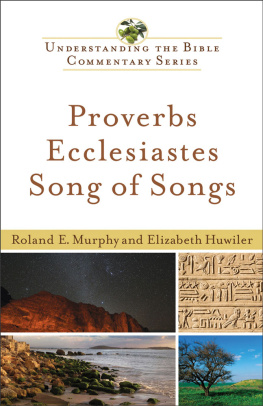Song of Songs
A S HAW B OOK
P UBLISHED BY W ATER B ROOK P RESS
2375 Telstar Drive, Suite 160
Colorado Springs, Colorado 80920
A division of Random House, Inc.
All Scripture quotations, unless otherwise indicated, are taken from the Holy Bible, New International Version. NIV. Copyright 1973, 1978, 1984 by International Bible Society. Used by permission of Zondervan Publishing House. All rights reserved.
ISBN-13: 978-0-877-88826-0
eBook ISBN: 978-0-307-82315-1
Copyright 2002 by Shaw Books, an imprint of WaterBrook Press
All rights reserved. No part of this book may be reproduced or transmitted in any form or by any means, electronic or mechanical, including photocopying and recording, or by any information storage and retrieval system, without permission in writing from the publisher.
S HAW B OOKS and its aspen leaf logo are trademarks of WaterBrook Press, a division of Random House, Inc.
v3.1
Contents
1 Intimacy Initiated
Song of Songs 1
2 Intimacy Refreshed
Song of Songs 2
3 Intimacy Desired
Song of Songs 3
4 Intimacy Described
Song of Songs 4
5 Intimacy Anticipated
Song of Songs 5
6 Intimacy Recovered
Song of Songs 6
7 Intimacy Fulfilled
Song of Songs 7
8 Intimacy Matured
Song of Songs 8
How to Use This Studyguide
F isherman studyguides are based on the inductive approach to Bible study. Inductive study is discovery study; we discover what the Bible says as we ask questions about its content and search for answers. This is quite different from the process in which a teacher tells a group about the Biblewhat it means and what to do about it. In inductive study, God speaks directly to each of us through his Word.
A group functions best when a leader keeps the discussion on target, but the leader is neither the teacher nor the answer person. A leaders responsibility is to asknot tell. The answers come from the text itself as group members examine, discuss, and think together about the passage.
There are four kinds of questions in each study. The first is an approach question. Asked and answered before the Bible passage is read, this question breaks the ice and helps you start thinking about the topic of the Bible study. It begins to reveal where thoughts and feelings need to be transformed by Scripture.
Some of the earlier questions in each study are observation questionswho, what, where, when, and howdesigned to help you learn some basic facts about the passage of Scripture.
Once you know what the Bible says, you need to ask, What does it mean? These interpretation questions help you discover the writers basic message.
Next come application questions, which ask, What does it mean to me? They challenge you to live out the Scriptures life-transforming message.
Fisherman studyguides provide spaces between questions for jotting down responses as well as any related questions you would like to raise in the group. Each group member should have a copy of the studyguide and may take a turn in leading the group.
A group should use any accurate, modern translation of the Bible such as the New International Version, the New American Standard Bible, the New Living Translation, the New Revised Standard Version, the New Jerusalem Bible, or the Good News Bible. (Other translations or paraphrases of the Bible may be referred to when additional help is needed.) Bible commentaries should not be brought to a Bible study because they tend to dampen discussion and keep people from thinking for themselves.
S UGGESTIONS FOR G ROUP L EADERS
1. Thoroughly read and study the Bible passage before the meeting. Get a firm grasp on its themes and begin applying its teachings for yourself. Pray that the Holy Spirit will guide you into all truth (John 16:13) so that your leadership will guide others.
2. If any of the studyguides questions seem ambiguous or unnatural to you, rephrase them, feeling free to add others that seem necessary to bring out the meaning of a verse.
3. Begin (and end) the study promptly. Start by asking someone to pray that every participant will both understand the passage and be open to its transforming power. Remember, the Holy Spirit is the teacher, not you!
4. Ask for volunteers to read the passages aloud.
5. As you ask the studyguides questions in sequence, encourage everyone to participate in the discussion. If some are silent, try gently suggesting, Lets have an answer from someone who hasnt spoken up yet.
6. If a question comes up that you cant answer, dont be afraid to admit that youre baffled. Assign the topic as a research project for someone to report on next week, or say, Ill do some studying and let you know what I find out.
7. Keep the discussion moving, but be sure it stays focused. Though a certain number of tangents are inevitable, youll want to quickly bring the discussion back to the topic at hand. Also, learn to pace the discussion so that you finish the lesson in the time allotted.
8. Dont be afraid of silences; some questions take time to answer, and some people need time to gather courage to speak. If silence persists, rephrase your question, but resist the temptation to answer it yourself.
9. If someone comes up with an answer that is clearly illogical or unbiblical, ask for further clarification: What verse suggests that to you?
10. Discourage overuse of cross references. Learn all you can from the passage at hand, while selectively incorporating a few important references suggested in the studyguide.
11. Some questions are marked with a  . This indicates that further information is available in the Leaders Notes at the back of the guide.
. This indicates that further information is available in the Leaders Notes at the back of the guide.
12. For further information on getting a new Bible study group started and keeping it functioning effectively, read You Can Start a Bible Study Group by Gladys Hunt and Pilgrims in Progress: Growing Through Groups by Jim and Carol Plueddemann. (Both books are available from Shaw Books).
S UGGESTIONS FOR G ROUP M EMBERS
1. Learn and apply the following ground rules for effective Bible study. (If new members join the group later, review these guidelines with the whole group.)
2. Remember that your goal is to learn all that you can from the Bible passage being studied. Let it speak for itself without using Bible commentaries or other Bible passages. There is more than enough in each assigned passage to keep your group productively occupied for one session. Sticking to the passage saves the group from insecurity (I dont have the right reference booksor the time to read anything else.) and confusion (Where did that come from? I thought we were studying _____.).
3. Avoid the temptation to bring up those fascinating tangents that dont really grow out of the passage you are discussing. If the topic is of common interest, you can bring it up later in informal conversation after the study. Meanwhile, help one another stick to the subject.
4. Encourage one another to participate. People remember best what they discover and verbalize for themselves. Some people are naturally shy, while others may be afraid of making a mistake. If your discussion is free and friendly and you show real interest in what other group members think and feel, the quieter ones will be more likely to speak up. Remember, the more people involved in a discussion, the richer it will be.














 . This indicates that further information is available in the Leaders Notes at the back of the guide.
. This indicates that further information is available in the Leaders Notes at the back of the guide.